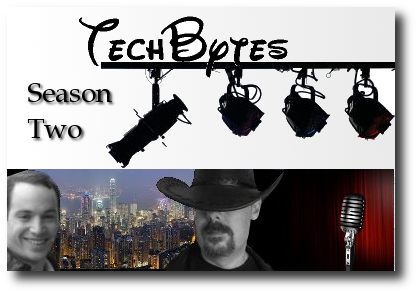Tuesday, July 31st, 2012, 6:36 am
Richard Stallman Against Software Patenting

Direct download as Ogg (12:12, 4.8 MB)
Summary: The fourth part of our interviews series with Richard Stallman covers software patents opposition for the most part
TODAY we turn our attention to software patents for the most part. Here is the transcript.
Dr. Roy Schestowitz: How do you judge the reliability of a news source and which one or ones do you favour?
 Dr. Richard Stallman: Well, how do I judge the reliability? To a large extent I look at the story and I try to judge based on the other things I know whether this looks like it’s bullshit or possible truth because there are news sources that I know often slant things. But that doesn’t mean that I think that their statements of facts would wrong, because I expect that they would be caught if were wrong. So, I don’t know of any news sources that I could say “that’s a good one” because they all have their positions, they all wanna say some things and not others. The question is, does it seem plausible that they would say falsehoods about facts? Because there is some embarrassment involved in getting caught in saying… in giving some news that wasn’t true. And that’s somewhat of a factor so that many places are not likely to say things that are just false. But they may draw conclusions that don’t really follows, or that reflect bias.
Dr. Richard Stallman: Well, how do I judge the reliability? To a large extent I look at the story and I try to judge based on the other things I know whether this looks like it’s bullshit or possible truth because there are news sources that I know often slant things. But that doesn’t mean that I think that their statements of facts would wrong, because I expect that they would be caught if were wrong. So, I don’t know of any news sources that I could say “that’s a good one” because they all have their positions, they all wanna say some things and not others. The question is, does it seem plausible that they would say falsehoods about facts? Because there is some embarrassment involved in getting caught in saying… in giving some news that wasn’t true. And that’s somewhat of a factor so that many places are not likely to say things that are just false. But they may draw conclusions that don’t really follows, or that reflect bias.
My next question is about the GPL. More recently there has been some exposure for what’s known as the GPL.next, which Richard Fontana…
No, no, it isn’t anymore. Basically, Richard Fontana was interested in exploring some ideas, so he started a project to get suggestions about what to put in a copyleft licence.
That name was not very nice because it implied that it would be the replacement, and of course for anyone to say “my work is going to replace your work” is a somewhat unfriendly thing to say, but that’s not what he seems to really mean, so I hope that he finds some interesting ideas through this.
My next question is, what do you consider to be the most effective strategy for elimination of software patents in the United States and worldwide as well?
Well, it depends on the country because this is a matter of political activity and how to do that effectively varies from country to country, so I can’t give authoritative advice to people in other countries. If I can even do so in the US, it wouldn’t apply to other places. I can suggest possible approaches to try, you know, meet with officials, organise and make a protest in the street, have protests at events if any officials from that part of international agencies that favour software parents are coming, protest them. If the US trade representative is visiting, or there are a thousand reasons to protest the visit of the US trade representative, what he wants is good for business and bad for people in every country including the US. So, how you influence politics in your country you’ll know probably a lot better than I do. But that’s what it involves very likely. But it may also involve legal action if your country’s courts could rule that software patents are not valid, well that’s very important. But maybe what you need is to find a lawyer to argue that case. Now, in the US, when an appeal is being heard, anyone can send a friend of the court brief, which is published presenting arguments to be considered. If you are in a country which has a practice like that, that can be helpful. But there is one point of which direction is going (?).
If the country does not have software patents, then it will work simply to make it clearer and firm that software patents are not allowed and put this into legislation so that the patent office can’t betray it. And you have to work hard making it iron-clad (?)so that the patent office can’t find an excuse to betray it. For instance, in many cases, there are countries in which computer programs can’t be patented. But the patent offices say, “we’re not issuing patents on computer programs, we’re issuing patents on techniques that can be used in computer programs.” Now, we think that those treaties and laws were meant to prevent that, but the patent offices reinterpret them in a way that means that becomes effectively void and doesn’t prevent any kind of patent that anyone would actually want to apply for. So you’ve got to be careful, you’ve got to study from a point a view, how could the patent office try to twist this?
However, there are countries which already have software parents and in those countries restricting the issuance of software patents would still leave you with maybe hundreds of thousands of existing software patents. What I recommend to the US is therefore, well, if the courts ruled that software patents were never valid, they would all disappear. So there is some hope that that may eventually happen. But what could Congress do? Congress can’t legislate the existing patents into non-existence. What it could however do is rule (or legislate) that patents are not infringed by developing, distributing or running software on general-purpose computer hardware if the hardware itself doesn’t infringe. And that way these patents would remain valid and they could be applicable to hardware devices but not to software. You see, patent systems don’t generally divide patents into software patents and hardware patents; it’s rather the patent would (?) cover a certain idea and maybe that idea is typically implemented in software, but the patent would also cover implementing it in hardware. So, we can in fact see that a certain patent is a software patent; my definition of a software patent is a patent that can prohibit programs. Because patents are not intrinsically labelled as software patents or hardware patents you can’t just say “we are going to prohibit software patents”, you got to define clearly what it is that’s not going to be issued or else legislate about where patents apply and where they don’t apply.
The next and last part will be published in a few days.
We hope you will join us for future shows and consider subscribing to the show via the RSS feed. You can also visit our archives for past shows. If you have an Identi.ca account, consider subscribing to TechBytes in order to keep up to date.
As embedded (HTML5):
Keywords: softwarepatents uspto monopoly gpl gplnext gnu fsf richardstallman
Download:






 Filed under:
Filed under: 

